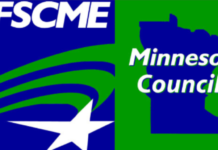Earlier this month, two separate class-action suits were launched against two public-sector unions in Minnesota. The plaintiffs, represented by the Liberty Justice Center (LJC), the Upper Midwest Law Center, and the National Right to Work Legal Defense Foundation, claim that The American Federation of State, County and Municipal Employees (AFSCME) Council 5 and Minnesota Association of Professional Employees (MAPE) unconstitutionally forced state employees to pay member dues.
Using a previous Supreme Court ruling that was friendly to public sector unions, public sector unions were able to take membership dues out of employees’ paychecks—whether they wanted to be in the union or not. But the Janus vs. AFSCME Supreme Court ruling changed that, and allowed public sector employees to finally opt out of paying union dues if they didn’t want to join a union.
The cases launched in May, Brown et al., v. AFSCME Council 5, and Fellows et al., v. MAPE, seek to return $19 million to state and local workers that was mandatorily taken out of their paychecks until the Janus decision in 2018. Specifically, the suits seek up to $13 million from AFSCME and almost $6 million from MAPE.
The plaintiffs consist of approximately 8,000 current and former public sector employees in the State of Minnesota. One plaintiff, a social worker, said money was taken out of his paycheck wrongfully from 2007 to 2018.
Fights over Janus
After the Janus decision, there have been legal fights across the United States as public-sector unions looked for ways to continue to collect dues from state workers. Often, in states like Minnesota and Washington where there is a strong traditional of public sector unions, new state employees have been bullied into joining the union, while policies have tried to make it near impossible for existing state employees to quit union membership.
Strong arm tactics employed by unions and union friendly state governments include making it near-impossible to leave a union—such as only allowing public employees to opt out of the union on one specific day of the year. Democratic politicians favor mandating that public employees pay dues because public sector unions give money to Democratic politicians and political causes. For example, both AFSCME and MAPE have a long history of supporting Democratic causes and candidates, and public sector unions in Minnesota are one of the top donors to the Minnesota Democratic Party (DFL).
Many of the cases against such strong-arm tactics that contravene Janus, including those in Minnesota, have laid the groundwork for the lawsuits seeking recompense for public sector employees who paid involuntary union dues over the years.
Doug Seaton of the Upper Midwest Law Center said, “The Upper Midwest Law Center is proud to be joining LJC again in these cases to fight for Minnesota public employees’ right to say no to supporting government unions, a right established under the Janus decision. The UMLC has successfully represented public employees in several similar cases, and looks forward to winning these and other Janus-related cases we have underway and in planning. Public employees can’t be held against their will and have their pay taken any longer by government unions.”
“Today, Minnesota’s state employees are standing up against two of the state’s most powerful unions to demand their money back,” explained Catrin Wigfall, policy fellow at Center of the American Experiment specializing in labor policy. “Ever since Janus was decided, Center of the American Experiment has been helping Minnesotans like these fight for their rights to keep their whole paychecks. It’s exciting to see the Janus case being enforced,” said Seaton.











